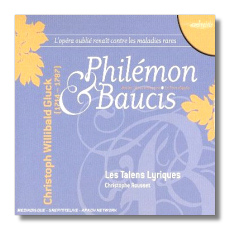
The Internet's Premier Classical Music Source
Related Links
- Gluck Reviews
- Latest Reviews
- More Reviews
-
By Composer
-
Collections
DVD & Blu-ray
Books
Concert Reviews
Articles/Interviews
Software
Audio
Search Amazon
Recommended Links
Site News
 CD Review
CD Review
Christoph Willibald Gluck

Philémon & Baucis
- Aristeo
- Bauci e Filemone
Ann Hallenberg (Aristeo, Una pastorella)
Ditte Andersen (Cirene, Bauci)
Marie Lenormand (Cidippe, Silvia, Filemone)
Magnus Staveland (Ati, Giove)
Choeur de Chambre de Namur
Les Talens Lyriques/Christophe Rousset
Ambroisie (Naïve) AMB9995 DDD 2CDs 97:38
These two short operas were composed in celebration of the marriage in 1769 of Ferdinand, Duke of Parma, and Maria Amalia, Archduchess of Austria. Ambroisie is claiming "Premier Enrigistrement Mondial" status here, and indeed, this recording does appear to be a first. Not all of the music is unfamiliar, though, because Gluck, in keeping with the custom of the times, cannibalized some of his earlier works for these two operas. With a third opera, an adaptation of Gluck's own Orfeo ed Euridice, and a prologue (not included here), the now evening-length entertainment was known as Le Feste d'Apollo. (Ambroisie makes things complicated by calling this set "Philémon & Baucis," although that is neither the correct omnibus title, nor the correct title of either of the operas.) Some of the best singers of the time came to Parma to perform it, including (as Bauci) soprano Lucrezia Agujari (a.k.a. "La Bastardella") who had an almost Yma Sumac-like range of four octaves!
I don't know how Danish soprano Ditte Andersen, this set's Bauci, compares to La Bastardella. Even so, her performance of the aria "Il mio pastor tu sei" from the second opera might have you shaking your head in disbelief over her high notes and her vocal agility. Gluck's librettist, Giuseppe Maria Pagnini altered the ancient Greek legend somewhat, and made the devoted elderly couple into a pair of young lovers. Offering hospitality to a disguised Jupiter (Giove) when no one else will, Philémon (Filemone) and Baucis (Bauci) are rewarded when their house is turned into a temple, and when Jupiter promises to turn both of them into trees so they can continue living together even after their human death. A happy story for a titled wedding, then.
Aristeo (Aristaeus), with a libretto by Giuseppe Pezzana, also is based on an old Greek tale. The title character, the son of Apollo, is a beekeeper whose bees were killed off by the Dryads in vengeance after he caused the accidental death of Euridice. Now Aristeo is sighing over Cidippe (Cydippe), who is a follower of his mother, the nymph Cirene (Cyrene). Cidippe returns his love, but Cirene warns her not to give in so quickly. Aristeo is advised to sacrifice bulls to placate the gods, and after doing so, swarms of bees emerge from the dead bulls' stomachs. With his luck turned around, Aristeo gets the girl, and everything ends well. Another happy story for a titled wedding, then.
I confess that I don't know as much of Gluck's music as I should, apart from Orfeo ed Euridice, and the odd aria here and there. Aristeo and Bauci e Filemone fell gratefully on my ears, however. The music isn't innovative or surprising, yet charm is something that it has in abundance. Each opera contains a handful of arias, and a couple of short duets, trios, and choruses. Additionally, Bauci e Filemone contains a cute (that is to say, not very threatening) instrumental movement depicting the thunderstorm with which Jupiter threatens the Phrygians who had not paid him proper respect!
The singers do double or triple duty. Only Hallenberg was previously familiar to me. Her rich yet flexible mezzo is aptly suited to music from the Baroque and early Classical eras. Andersen, as I suggested above, is quite remarkable, and Lenormand does good work too. Staveland's contributions seems more tentative, but he doesn't really let the ladies down. The stars of the show, however, are Rousset and Les Talens Lyriques. A fine harpsichordist, Rousset is increasingly showing his value as a conductor. He founded Les Talens Lyriques in 1991, and his music-making is always crisp, but not aggressive or rushed.
The booklet contains sung texts, translations, and biographies of the performers. There are several passages which are printed but not performed; are these cuts made by Rousset (or Gluck), or did Gluck simply not set everything with which the librettists provided him? At any rate, this was a little confusing, as was Ambroisie's decision not to include track numbers within the libretti themselves.
Copyright © 2007, Raymond Tuttle




















